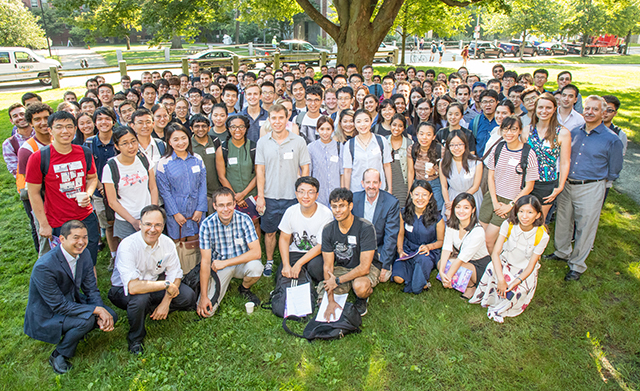This year’s incoming graduate students have a wide variety of backgrounds and bring a richly diverse set of skills, experiences, and interests to the Harvard John A. Paulson School of Engineering and Applied Sciences (SEAS).
Read on to meet a few of the newest members of the SEAS family.
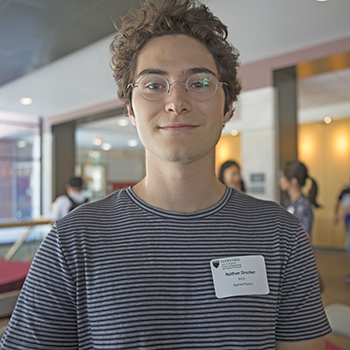 NAME: Nathan Drucker
NAME: Nathan Drucker
INTENDED HARVARD DEGREE: Ph.D. in applied physics
RESEARCH MENTOR: Jenny Hoffman, Professor of Physics and Applied Physics
AREA OF STUDY: Quantum materials
HOMETOWN: Pittsburgh
UNDERGRADUATE Training: Physics and materials science at Carnegie Mellon University
I’m most looking forward to the resources that are available at Harvard, in terms of coursework and collaborations with fellow researchers. What is most exciting about the material science research here at SEAS is that it is on the cutting edge. We are really at the frontier of knowledge about how materials work and how electrons behave in different materials. There are a lot of fascinating properties and interactions that theorists and experimentalists are working hard to understand.
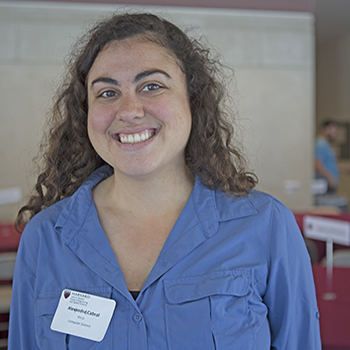 NAME: Alexandra Cabral
NAME: Alexandra Cabral
INTENDED HARVARD DEGREE: Ph.D. in computer science
RESEARCH MENTOR: Krzysztof Gajos, Gordon McKay Professor of Computer Science
AREA OF STUDY: Machine learning and human computer interaction
HOME STATE: New Jersey
UNDERGRADUATE Training: Computer science at Columbia University
I’m still not sure where I’ll focus my research. Lately, I’ve been thinking a lot about environmental health and computational sustainability, so I think it would be cool to find some sort of overlap between environmental engineering and computer science. Otherwise, I’m interested in education. I just came from being a computer science teacher in San Diego, so I think that would be interesting, as well. I definitely want to focus on something that has a positive impact outside the scope of what is thought of as computer science or engineering. I’m looking forward to being able to explore all the different ways that technology and computer science can be applied in fields that I haven’t even thought of yet.
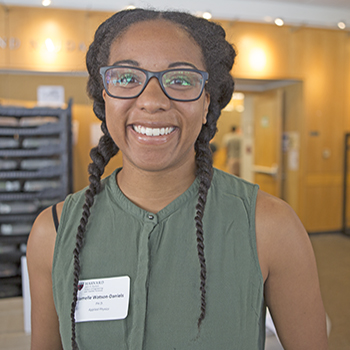 NAME: Jamelle Watson-Daniels
NAME: Jamelle Watson-Daniels
INTENDED HARVARD DEGREE: Ph.D. in applied physics
RESEARCH MENTOR: Marko Loncar, Tiantsai Lin Professor of Electrical Engineering
AREA OF STUDY: Optics and photonics
HOMETOWN: St. Louis
UNDERGRADUATE Training: Physics at Brown University
I took two years off to work in industry, so I’m really excited to get back to research. I really like the idea of the unknown and exploring problems, as well as deciding which problems are worth solving. The Loncar Lab does a lot of work in optics and photonics, and I’m interested in the ways we can utilize light in technology. There are a lot of straightforward applications in terms of fiber optic networks and different components and modulators that make up those networks. Some of the work we are doing is to improve those components, as well as change the different materials that we use to make those components on the nanoscale, which is pretty cool.
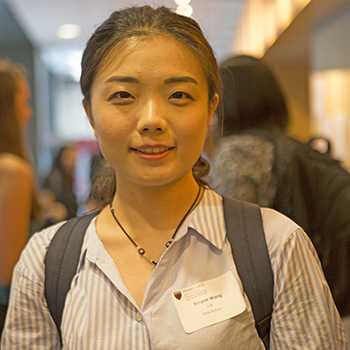 NAME: Xinyue Wang
NAME: Xinyue Wang
INTENDED HARVARD DEGREE: S.M. in data science
AREA OF STUDY: Data science
HOMETOWN: Tianjin, China
UNDERGRADUATE Training: Computer science and economics at Brandeis University
During my undergraduate studies, I had the opportunity to do some independent research, but I felt like I needed to pick up more skills in data science to really understand how to study models, deal with data, and clean data. I’m looking forward to learning more about statistics and coding in Python, which are skills that will prove very useful in industry. I felt drawn to data science because I’ve always been a very curious person. I think data science is a very useful tool to help us analyze and figure out the reasons behind some of the phenomena that exist in the world today.
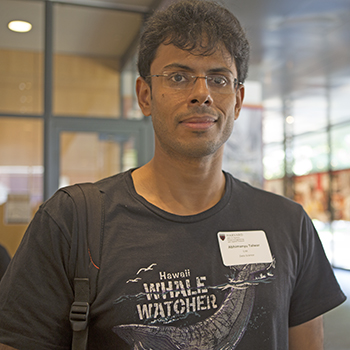 NAME: Abhimanyu Talwar
NAME: Abhimanyu Talwar
INTENDED HARVARD DEGREE: S.M. in data science
AREA OF STUDY: Data science
HOMETOWN: Delhi, India
UNDERGRADUATE Training: Computer science at the Indian Institute of Technology in Delhi
I spent the past decade working in finance, and over the past five years, I saw a lot of developments happening in the area of machine learning and deep learning, which have many applications in computer vision and natural language processing. I wanted to be a part of that revolution. I’m really looking forward to the interaction with faculty. I want to pursue research and I think faculty guidance will be critical for that part of my journey. My primary motivation in research is helping stroke patients. They often lose their ability to speak; they can understand everything in their mind, but they can’t convey their thoughts. Using the developments we have today in computer vision and natural language processing, a system can actually take cues from their face and the intonation of their voice and plug the gaps where they are not able to put their thoughts into words.
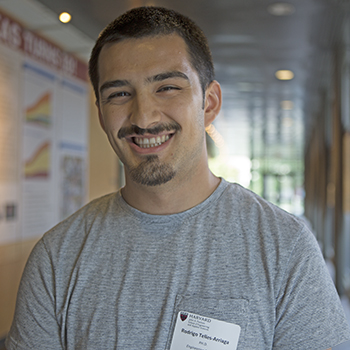 NAME: Rodrigo Telles-Arriaga
NAME: Rodrigo Telles-Arriaga
INTENDED HARVARD DEGREE: Ph.D. in engineering sciences – materials science and mechanical engineering
AREA OF STUDY: Materials science, with a focus on soft matter
HOMETOWN: Tracy, Calif.
UNDERGRADUATE Training: Chemical engineering at the University of California, Berkeley
I find the field of materials science to be very exciting. I’m really interested in our ability to come up with new materials that have very specific properties. You can tackle problems like that from so many different angles. Maybe you start at the molecular scale and tweak different atoms, manipulate those properties, and see how those changes manifest at the macro scale. That kind of research really interests me. It is rewarding to know that you can do all these little things in the lab, but it can have huge implications, not only for your research, but also for the world because we can develop new materials that are useful in many different applications.
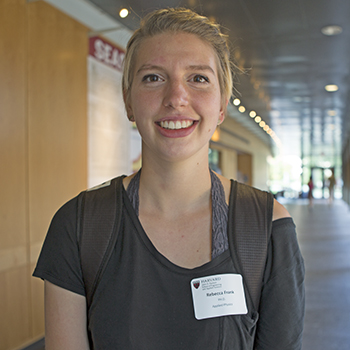 NAME: Rebecca Frank
NAME: Rebecca Frank
INTENDED HARVARD DEGREE: Ph.D. in applied physics
RESEARCH MENTOR: Jene Golovchenko, Rumford Professor of Physics and Gordon McKay Professor of Applied Physics, and Rob Howe, Abbott and James Lawrence Professor of Engineering
AREA OF STUDY: Biophysics
HOMETOWN: Baltimore
UNDERGRADUATE Training: Physics and math at Northeastern University
I really enjoy working with physics and understanding how things work in the world around us, but I decided to pursue an applied physics Ph.D. because I want to do research that is focused on something tangible, so it can be put to use in the real world. Working on bio-inspired solutions seems very interesting because we rely on our bodies and biological processes so much, yet it is shocking how little we understand about those systems. I’m excited about research because I think it is really cool to be able to figure out things that people don’t know, or look at things that you see everyday and be able to understand then and use that understanding in new and unique ways. That’s how we further society, by learning more and increasing our understanding.
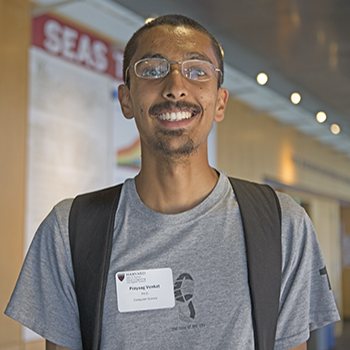 NAME: Prayaag Venkat
NAME: Prayaag Venkat
INTENDED HARVARD DEGREE: Ph.D. in computer science
RESEARCH MENTOR: Boaz Barak, Gordon McKay Professor of Computer Science
AREA OF STUDY: Theoretical computer science
HOMETOWN: Baltimore
UNDERGRADUATE Training: Computer science and math at the University of Maryland
I am really interested in pursuing projects at the intersection of physics and computer science. The work of Prof. Barak is very interesting because it touches on a lot of different areas of mathematics and computer science. There are a lot of applications that relate to machine learning, and how we can use methods from physics to solve machine-learning problems. I’m looking forward to soaking up the academic environment here in Boston. There are so many universities here; there are a lot of seminars and colloquia to attend, so I’m looking forward to attending many of those and learning about a lot of new areas and subjects.
